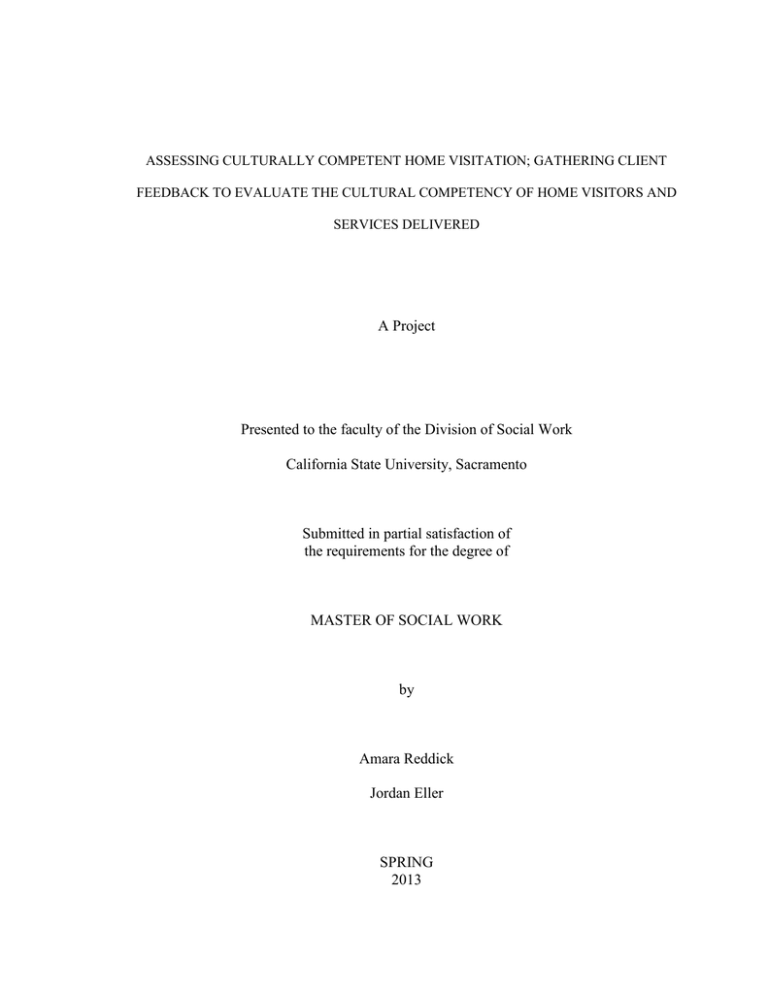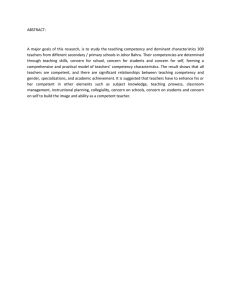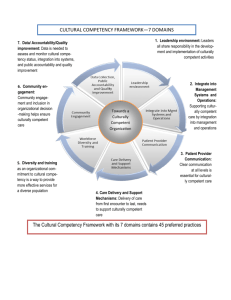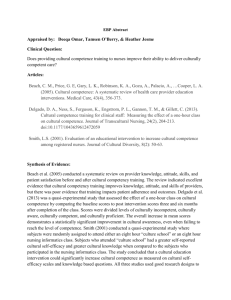
ASSESSING CULTURALLY COMPETENT HOME VISITATION; GATHERING CLIENT
FEEDBACK TO EVALUATE THE CULTURAL COMPETENCY OF HOME VISITORS AND
SERVICES DELIVERED
A Project
Presented to the faculty of the Division of Social Work
California State University, Sacramento
Submitted in partial satisfaction of
the requirements for the degree of
MASTER OF SOCIAL WORK
by
Amara Reddick
Jordan Eller
SPRING
2013
© 2013
Jordan Eller
Amara Reddick
ALL RIGHTS RESERVED
ii
ASSESSING CULTURALLY COMPETENT HOME VISITATION; GATHERING CLIENT
FEEDBACK TO EVALUATE THE CULTURAL COMPETENCY OF HOME VISITORS AND
SERVICES DELIVERED
A Project
by
Jordan Eller
Amara Reddick
Approved by:
___________________________, Committee Chair
Teiahsha Bankhead, LCSW, Ph.D.
____________________________
Date
iii
Student:
Jordan Eller
__Amara Reddick____
I certify that these students have met the requirements for format contained in the
University Format Manual, and that this project is suitable for shelving in the Library,
and credit is to be awarded for the project.
___________________________________, Graduate Coordinator_________________
Dale Russell, Ed.D., LCSW
Date
Division of Social Work
iv
Abstract
of
ASSESSING CULTURALLY COMPETENT HOME VISITATION; GATHERING CLIENT
FEEDBACK TO EVALUATE THE CULTURAL COMPETENCY OF HOME VISITORS AND
SERVICES DELIVERED
by
Jordan Eller
Amara Reddick
This research study focuses on assessing culturally competent home visitation services
from the perspective of the client. A review of the literature finds that although gathering
client feedback is important to service delivery, there is a lack of research evidence
established by gathering client feedback on the cultural competency of their service
providers, as well as a scarcity of tools to measure cultural competency from the client
perspective (Clark, 2010; Cornelius et al., 2004; Switzer et al., 1998; Fuertes & Brobst,
2002; Lum, 1999; Bhui et al., 2007; Ahmed & Bates, 2012). Therefore, this study
attempted to find and adapt a tool that could be used to measure the cultural competence
of a local home visitation program. Participants (N=24) in the agency were surveyed via
mail regarding their perceptions of their home visitor and the agency’s cultural
competence. The tool used is comprised of eight subscales repeatedly found in the
literature assessing factors relating to cultural competence. The purpose of this study is to
determine if the clients’ perceptions of the cultural competence of the services received,
v
is reflective of the service providers’ philosophies and standards of cultural competence.
Findings demonstrated that the culturally competent practices of the service provider
were reflected in the perception of the clients. An analysis of the descriptive statistics
showed that 100% of participants felt their home visitor respected them and their cultural
beliefs. Significant positive correlations demonstrate a close relationship between the
varying skills of culturally competent practice.
Furthermore, only one statistically
significant t-test result between the responses of the racial groups represented was found
in the study. The varying perceptions differed on the Consumer Involvement subscale;
White participants felt less involved than People of Color in receiving support from their
home visitor in areas outside of child rearing, the confidentiality of the home visitor, and
support for ethnic matching with the service provider. The overall findings suggest that
implementing standards for culturally competent service delivery are positively reflected
in clients’ perceptions of services.
____________________________, Committee Chair
Teiahsha Bankhead, LCSW, Ph.D.
_______________________
Date
vi
ACKNOWLEDGEMENTS
Amara Reddick’s Acknowledgements
I would like to thank and appreciate all of the tremendously fabulous people in
my life who have supported my personal and professional development. To my stellar
support team thank you for encouraging me to be great. A special thanks to my chef,
chauffeur, errand runner, sounding board, and resident expert in anything statistical; how
so much wonderful can be condensed into one person I cannot comprehend and am
immeasurably grateful. Thank you to my thesis partner for her willingness to be flexible,
honest, patient, and caring at the same time imposing structure and having a detailed
oriented perspective.
Jordan Eller’s Acknowledgements
First and foremost, I would like to thank my thesis partner for her patience and
understanding with my obsessive and neurotic ways; including my hectic schedule.
Along this journey, I have been surrounded by tremendous professors, colleagues, and
individuals that have enhanced my skill-set and provided me with the motivation to excel
as an exemplary social worker. I have to give props to my brother, Ethan, for giving me
that motivational “shove” I needed to apply for graduate school; I would not be here
without your diligent harassment Edog! Thank you to my sister, Genevieve, who
provided me with encouragement, food, and many productive study sessions. A special
thanks goes to my many dear and close friends for making me laugh and supporting me
through my daunting complaints and overall absence these past two years. Thanks to my
vii
precious nieces and nephew for being so full of positive energy and making me smile!
And last but not least, thank you to my mother, father, stepmother, and sweet, sweet Nana
for their unconditional love, support, and words of wisdom. Thank you all for believing
in me. Cheers to you all and to me!
Researchers’ Quote for Social Work Practice
Go to the people
Live Among them
Learn from them
Love them
Start with what they know
Build on what they Have:
But of the best leaders
When their task is accomplished
Their work is done
The people will remark
“We have done it ourselves”
-Lao Tzo 2000, Chinese Proverb
viii
TABLE OF CONTENTS
Page
Acknowledgements ..................................................................................................... vii
List of Tables .............................................................................................................. xii
List of Figures ........................................................................................................... xiii
Chapter
1. STATEMENT OF THE PROBLEM ……………….………………………….. 1
Statement of Collaboration ………………………………………………….. 1
Background of the Problem ………………………………………………… 2
Statement of the Research Problem …………………………………………. 5
Study Purpose…………………………….…………………………………...5
Theoretical Framework ………………….……………………………………5
Definition of Terms ……………………..………………………….….…….. 6
Assumptions …………………………………………………………………..7
Social Work Research Justification ………………………………..…..….…. 7
Study Limitations ………………………………………………………..……7
2. REVIEW OF THE LITERATURE ........................................................................ 9
Effects of Cultural Competency on Service Delivery ………………………..10
Commonalities of Cultural Competence Theories and Standards of Practice..13
Strategies for Developing Cultural Competency …………………………….20
Barriers to Culturally Competent Home Visitation Services…………………27
Evaluating Cultural Competency ……………………………………..…….. 31
ix
3. METHODS …………………………………………………………………….. 42
Study Objectives …………………………………………………………… 42
Study Design ……………………………………………………………….. 42
Population………………………………………………………………...43
Sampling Procedures …………………………………………………….….43
Data Collection Procedures …………………………………………………43
Instruments ………………………………………………………………….44
Data Analysis ………………………………………………………………..45
Protection of Human Subjects ………………………………………………46
Summary ……………………………………………………………………46
4. STUDY FINDINGS AND DISCUSSION……………………… ……………. 48
Overall Findings ………………………………………………………….…48
Specific Findings …………………………………………………………... 52
Interpretations of the Findings ………………………………………………61
Summary …………………………………………………………………….66
5.
DISCUSSION ………………………………………………….………………68
Summary of Study …………………………………………………………..68
Implications for Social Work ……………………………………………….76
Recommendations …………………………………………………………..77
Limitations ………………………………………………………………….78
Conclusion ……………………………………………………………….... 79
x
Appendix A. Client Consent to Participate ………………………………………. 82
Appendix B. Consentimento del Cliente Para Participar………………………….. 84
Appendix C. Step by Step/Paso a Paso’s Cultural Competency Services Survey.....86
Appendix D. Encuesta de Servicios Competencia Cultural Paso a Paso…………...90
References ................................................................................................................... 94
xi
LIST OF TABLES
Table
Pages
1. Common Components of Theories and Standards on Culturally Competent
Service Delivery...……….………...................................................................19
2. Common Factors of Evaluating Individual and Organizational Cultural
Competence……………………………………………………………….….34
3. Awareness of Client Culture………………………..…………………….….53
4. Respectful Behaviors………………………………….…………...………...54
5. Potential Language/Interpreter Issues…………………….………………….55
6. Home Visitor’s Understanding of Indigenous Practices…….……………….56
7. Consumer Involvement……………………………………………….……...57
8. Acceptance of Cultural Difference………………………………...…..…….59
9. Community Outreach………………………………………………………...60
10. Client-Provider-Organization Interactions…………………………….……..61
11. Home Visitor Understanding and Respect of Indigenous Practices Subscale
Correlations………………………………………………………….....…….63
12. Other Subscale Correlations……………………………...……………..…...64
13. Group Statistics By Race ………………...……………………………..…...65
14. Consumer Involvement Response Variance by Race………...…………..….66
xii
LIST OF FIGURES
Figures
Page
1. Participants’ Race..……………......................................................................50
2. Participants’ Ethnicity ……………………………………….…………….50
3. Participants’ City of Residence
…………………………….…………….51
4. Participants’ Highest Level of Education ………………………….……....52
xiii





